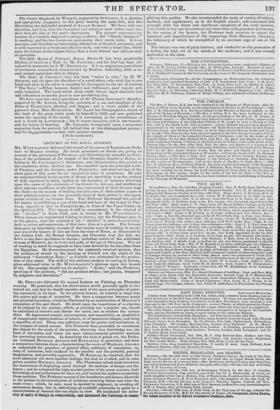lifr.Pfuraars delivered his second Lecture on Painting on Thursday evening.
He premised, that his observations would generally apply to his- torical art, and that he should consider each of the main principles of paint ing separately in its turn. In the present lecture, he entered at large into the nature and scope of invention. He drew a comparison between poetic and pictorial invention, which he illustrated by an examination of MILTON'S conception of Sin and Death. He dwelt upon the importance of a selection of fit subjects by the painter, which, as painting was a popular art, should be calculated to interest and elevate the mind, and to awaken the sympa- thies. He deprecated conceit, extravagance, and eccentricity, as productive of exaggerated representations of nature, or of monstrous images, and being a superflux of art. There was sufficient scope for genius and enthusiasm in the compass of actual nature. The Professor then proceeded to enumerate the objects for the study of the painter, observing that knowledge was the basis of invention, and vision the most instantaneously powerful medium for conveying instruction. In describing the class of grand art, the Profes- sor instanced MICHAEL ANGELO and RAFFAELLE in particular, and drew a comparison between them ; characterising the works of MICHAEL ANGELO as remarkable for grandeur of general effeet, sublimity of conception, va- riety of invention, only confined by the possible and the probable, poetical imagination, and powerful expression. Of RArnAEL he observed, that his style addressed the more familiar feelings, but that he rivalled, and in some points excelled MICHAEL ANGELO. The Florentine school made invention the instrument of displaying mind through the medium of design and the figure ; and he eulogized the high-minded genius of the great masters, their knowledge of and enthusiasm for their art, and incited the students to emulate those qualities. The Professor treated of the boundaries and licence allowable to the painter in the introduction of incidents occurring before and after the „ main event ; which, he said, must be decided by judgment, in avoiding all extraneous matter, but in embodying all available accessories to assist by a concentration of interest the one object in view. He inculcated the neces- sity of wuty of design in composmon, and instanced the Cartoons 04 OZMA"
plifying this quality. He also recommended the study of variety of subject, incident, and appearances, as in the English school ; and contrasted this principle with the direct and significant simplicity of the early masters, with which it was not inconsistent any more than with grandeur and beauty. In the course of the lecture, the Professor took occasion to regret the tameness and imperfections of the engravings from MICHAEL ANGELO, the deficiency of which he exemplified by an accurate copy of one of his heads.
The lecture was one of great interest, and conducive to the promotion of a feeling for high art in the minds of the students ; and it was warmly applauded at the close.


















 Previous page
Previous page